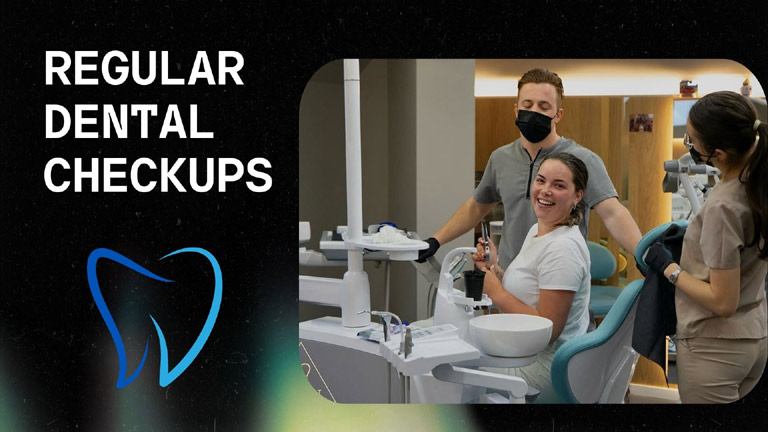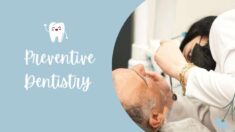
People everywhere show their bright smiles when they meet someone, laugh, or in front of the camera. If you are concerned about your teeth, don’t worry – many others share the same concerns. Like any other major sign, it is important to regularly caре for this sign. Dental checkups play a crucial role in maintaining your oral health, ensuring your teeth and gums look their best on camera.
Visiting the dentist should be a pleasant experience. Every dental clinic wants you to enjoy your dental exam and cleaning as much as a trip to the spa for your teeth. I know they matter, but why? It’s time to sort out the confusion and get to what really shines.
How Can I Have a Beautiful and Brighter Smile?
Healthy smiles are wonderful, but some of us may still wish they looked a little shinier. Regular examination is the main part of all cosmetic dental care. We must check the health of your teeth before we can safely whiten, straighten, or enhance them. For that reason, Dentists always ensure you’ve had good dental maintenance before beginning any cosmetic procedure.
If your smile is clean and healthy, you are ready for cosmetic dental care.
- Professional teeth whitening that doesn’t cause sensitivity
- Wear aligners to straighten your smile, without the need for metal braces.
- Adhesive procedures for fixing chips and gaps
- Veneers to completely improve your smile
However, the most exciting aspect is that during your routine visits, you can assess your smile goals and devise steps to help you achieve them. Your teeth and gums need to be healthy before anything else.
What Happens During a Dental Exam?
Have you ever asked yourself what all those tools are used for? Why is the hygienist making notes as they palpate inside your mouth? Let’s get to the bottom of what’s involved in dentistry!
A typical dental exam and cleaning includes the following steps:
- Hygienists remove the difficult plaque and tartar that escapes your toothbrush during your dental visits
- Evaluating each tooth to ensure that no cavities, cracks, or wear are developing early.
- Good Check! Healthy gums help prevent dental problems. Measure the tight spaces between your teeth and gums to confirm that everything remains in place and healthy.
- Completing the process with a gentle polish that smooths out your teeth, making your tongue feel as if it’s vacationing at a five-star hotel.
What’s the best thing about that? All our explanations are provided in real time, so you know exactly what’s happening with your smile and how to care for it.
Does keeping your teeth clean mean you won’t need to go to the dentist?
Be assured, it’s your everyday brushing and flossing that are truly the main heroes of your oral care. Do you think that Olympic athletes don’t need coaches?
Keeping your teeth healthy every day is like mopping your floor each day. Still, you won’t be able to maintain good hygiene without going after the tough-to-reach corners one day. Your dental exam and cleaning deal with problems your toothbrush can’t reach.
Even the most expert brusher can’t do these things at home:
- You should remove hardened tartar.
- Avoid the pain by catching very small cavities early.
- Look beneath your old fillings or crowns for signs of decay.
- Catching gum disease as soon as possible gives you a better chance of treating it.
- Check the mouth for oral cancer and other oral health issues.
Is the Dental Exam Painful?
It’s clear why some people skip the dentist: Pain often makes them uneasy. We’re aware of your situation! Few experiences are less pleasant than having an uncomfortable mouth.
There’s some good news about this, too. For those who are not comfortable or have sensitive mouth issues, dental clinics, take special measures to ensure their comfort.
- Products that help reduce discomfort during cleanings
- Take a break whenever you feel it’s needed.
- Telling students about what to expect in every step
- Troubles like ceiling- or wall-mounted televisions or music
- Drilling down more gently on nervous people
Preventive care is your best way to avoid feeling dental pain. If you attend regular checkups, any problems found will usually be minor and easy to address. If you wait too long, the crisis becomes truly difficult.
How Often Should I Schedule a Dental Visit?
It’s understandable if you wonder if this advice is just a way for dentists to gain more patients. The recommendation to visit every six months is based on how quickly issues can arise in your smile. For most of us, six months is the best period to help us:
- Spot problems early so they can be treated right away.
- Tartar is formed when plaque hardens; therefore, it is essential to remove plaque daily.
- Keep track of your oral health as time goes on
- Maintain your pearly whites every day of the year
Regular dental exams and cleaning examinations will save you from wasting time, effort, and pain in the future.
Is Going to A Dentist Expensive?
Visiting the dentist on a regular schedule is usually the most economical way to maintain your oral health. Keep the expenses in mind:
- Most check-ups and cleanings cost between $100 and $300, which insurance often covers.
- Cavity filling usually costs between $150 and $400.
- You can expect to pay $1,500-3,000 for a root canal and crown.
Do you see what’s happening here? It is much more affordable to prevent a problem than to treat it. You don’t want to wait until the engine shuts down; stock your shelves before it’s too late. Preventive care is something dentists strive to make accessible and easy for everyone.
Couldn’t I Wait Until I am in pain Before Visiting the Dentist?
The reasoning behind this approach makes sense. It doesn’t make sense to repair things that work perfectly. Even so, when you start feeling pain, you have probably already missed the chance for a quick, simple fix.
Problems with your teeth often silently grow over time. Often, these problems grow deeply and painlessly for a period before causing any symptoms. For example:
- You usually don’t feel pain from cavities until they are near the nerve.
- You might not have symptoms from gum disease until bone loss occurs.
- It’s only when the cracks in a tooth become very big that you may start to feel pain.
- At first, oral cancer can be hard to spot because few symptoms are present.
Regular dental exams and cleaning can help prevent these health issues from becoming serious.
If you know you should see your doctor but haven’t, now is a good time to schedule an appointment. Your future years will be better when your face isn’t pained by ice cream or when your smile comes out naturally in pictures.


